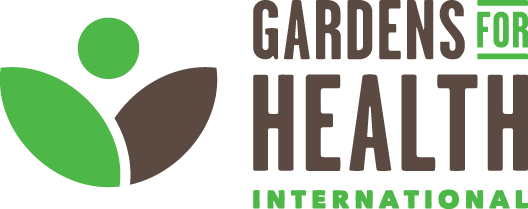Prepped for COVID-19: "Because I’d planted vegetables, we survived.”
Didanciene Nirere cradles baby Alex in her arms and points, directing his gaze to the slopes of the hill spilling out below them. It’s abundant with fruits and veggies - carrots, eggplant, and even pineapple - and Didanciene planted it all.
New mom Didanciene with four-month-old Alex.
The mother of three graduated from Gardens for Health’s Maternal Nutrition Program in March, just as Rwanda was headed into a country-wide COVID lockdown. At the time, she was pregnant with Alex and uncertain about what the future held.
“Having a baby during COVID was difficult; I felt so pained and sad,” she reflects, “but because I’d planted vegetables, we survived. I could harvest and cook the vegetables from my garden, and I’m grateful for that.”
Didanciene farms neighbors’ land for a living; before GHI trainings, she didn’t have a garden of her own. “I planted veggies at home because I learned their importance, and how to build a home garden.”
“I learned a lot from GHI trainings. For instance, in agriculture lessons, I practiced using natural manure as fertilizer and double-digging the garden beds, which yields more vegetables. I tried planting fruits and new vegetable varieties, and am exploring agroforestry (planting trees) which will encourage better growth of other crops.”
GHI lessons were particularly useful as Rwanda faced COVID-19. “The hygiene lessons were crucial. Before GHI, I didn’t care about handwashing; we didn’t understand the importance. Now, I can’t count the number of times I wash my hands each day: before breastfeeding, before preparing food, or after cleaning the baby or using the toilet, for example.” In fact, Didanciene has a handwashing station outside her front door.
She also talks enthusiastically about GHI’s One Pot One Hour method to create easy, balanced meals. “It mixes nutrients and uses less firewood and time by pre-soaking the beans, which was a problem before. I can confidently tell you that I eat vegetables every day.” Among the family’s favorites are amaranth, cassava leaves, and carrots.
The addition of micronutrients to the family diet has increased Didanciene’s supply of breastmilk. “I used to lack enough breastmilk, because of a lack of nutrients. We used to eat only potatoes mixed with beans. But my problem is solved now, and I have enough to feed my baby.” Breastfeeding, she explains, is important for a baby’s development.
“I didn’t give much thought to breastfeeding. But I learned to give it more time and do it correctly, not rushing and taking at least 30 minutes to feed my child.”
“I also learned the significance of prenatal care visits. Before, I’d go to a health clinic only once or twice while pregnant, but this time I went for all four recommended prenatal care visits.”
Didanciene is proud of her family’s progress. “I practice all the lessons I mentioned in our home. And I teach all this knowledge to my children, too.”
“In the future, God willing, I wish to plant many vegetables to both eat and sell at the market. And for my children, I want them to study well, excel in their academics, and earn degrees.”
Didanciene with her husband and three boys.
Photos and story by Jessica Wright.







